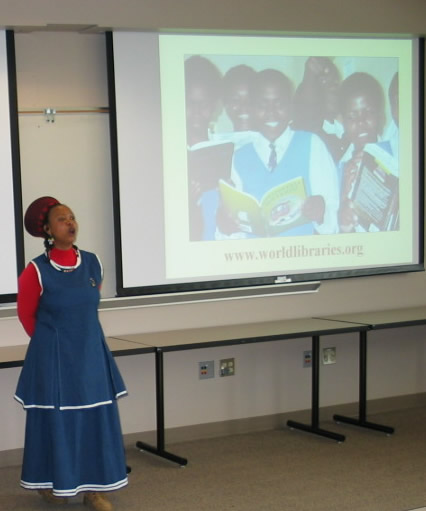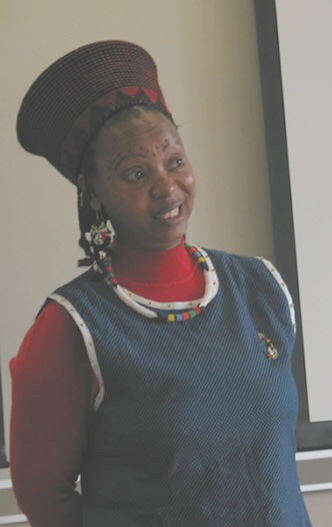By Katy Dichter and Emily Inlow, day MLIS
On April 4, 2005, Whiskey Monama, a young librarian, social worker and activist from Soweto, South Africa, visited the iSchool to share her experiences of being a librarian in South Africa. She used songs and storytelling to bring her story to life. For those in the audience, it was a lesson in how a library must be relevant to its community, and how even in times of extreme crisis, the librarian is a vital member of the community.
Whiskey grew up in a South Africa that was divided by apartheid. Under the apartheid government, black South Africans received an education guided by the
Bantu Education Act of 1953. Whiskey described the effects of this law, which mandated that black South Africans be taught domestic service skills instead of the curriculum taught to white South Africans.
Whiskey also vividly presented the current problem of AIDS in her hometown and in South Africa. She provided some chilling statistics: there are over 1,000,000 AIDS orphans in South Africa alone. There are over 100 orphans on her block at home, and three orphans, unrelated to her, living under her roof. Grandparents care for babies because the parents are dead. And because there's a shortage of food, AIDS medication, when available, makes people sick.

So why did a librarian travel thousands of miles to tell us about Bantu education and AIDS? Because her message was this: her library is a platform for fulfilling any and every need of her community.
Whiskey saw that when children were coming into the library, they weren't reading the books. She eventually figured out that they couldn't read. So Whiskey got their addresses and visited their homes. She knew that most parents worked hard labor jobs, and would only be home on Friday and Saturday nights. So that is when she went to visit their homes. She brought books with her, and asked the parents to read to their children. She soon learned that the parents couldn't read either, or they could only read Zulu. So she goes house to house on weekends convincing parents that even if they can't read, they should tell their children stories to teach them the skill of listening, which can help them walk the path to literacy. And she encourages parents to look at the library books with their kids, and take them to the library whenever they can.
AIDS is crippling her town and her nation. Whiskey's library is a place for AIDS education. Children come to the library to get condoms, asking Whiskey to wrap them in paper so no one will know. "Just don't waste them!" she tells everyone. Whiskey fills a
calabash , a traditional African carved gourd, with condoms, and places them throughout the library.

She has also built a small area in a corner of the library that looks like a house, which she calls the blue and purple house. It has become a place for kids to ask her personal or sensitive questions. She often will sit down with children and young adults, and they will to talk to her, 'Mama Whiskey', about their problems. If they can't understand the nurse at school because of a language difference, they will come to her to ask questions. Health education is the most important information she dispenses from the blue and purple house.
Whiskey talked about the future of her community, singing songs and expressing dismay at the time, ten years from now, when the grandparents won't be able to take care of the orphans anymore. She wants to find a way to get video cameras into the hands of children whose parents are sick with AIDS, so they may film what may be the last days of their parents, giving them a tangible record of the stories, the knowledge, love, and wisdom of a dying generation. She called on everyone to become "Global Mothers," reiterating what she had said earlier in the talk, "I'm a librarian. My dream is to be a librarian. What will I do when I retire? I'll be a librarian." She ended her talk by leading everyone in singing the South African national anthem, a song that is sung in six different languages.


